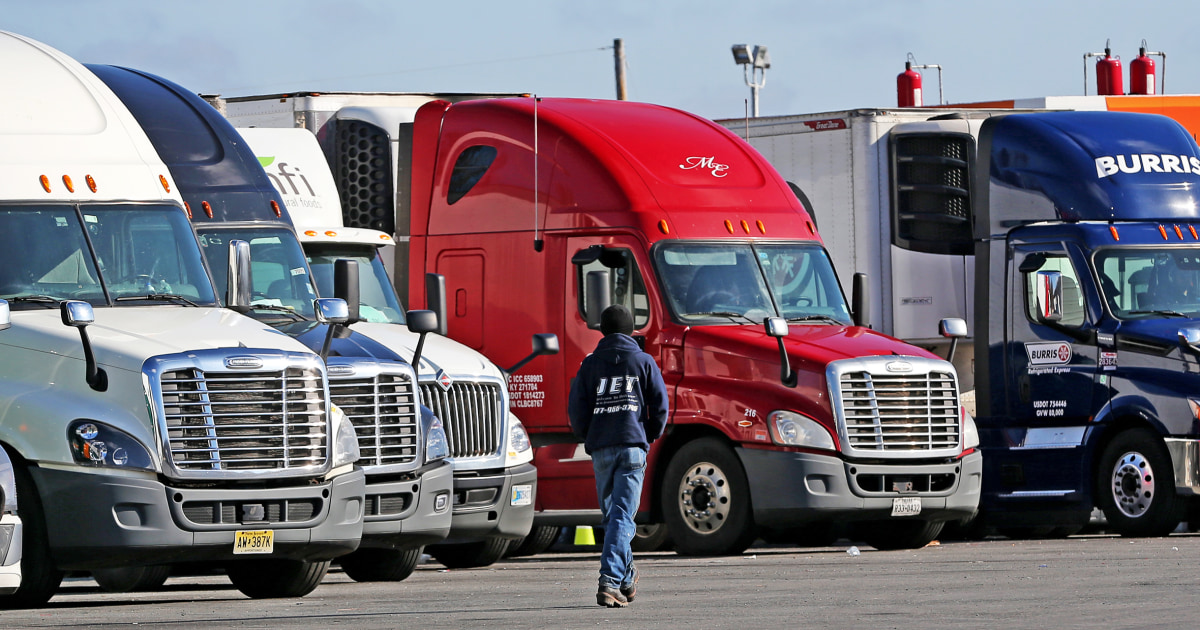
All Carl Smith wants is a place to park his freight truck. He thinks it’s a simple request that’s never fully granted.
Over his four decade trucking career, there have been times when the Ohio man needed to pull over because he was tired or had encountered dangerous weather.
It’s becoming increasingly difficult for him to find a place to legally park, however.
“There are times during inclement weather where you have to find a place to park,” said Smith, 61, who delivers liquid chemicals to Milwaukee. “Pretty much, all vehicles are going to want to get off the road and there just aren’t enough adequate parking spaces.”
His dilemma is not uncommon among the 3.5 million American truckers transporting freight from state to state, drivers said.
Inadequate truck parking over the past several decades is one reason why truckers have left the industry, contributing to the nationwide shortage of roughly 80,000 drivers that has exacerbated global supply chain issues, experts say.
“The answer is absolutely, yes. It’s one of the top reasons why they are leaving,” Daniel Murray, senior vice-president of the American Transportation Research Institute, said of the lack of truck parking. “When truck parking goes south, they just throw up their hands and say ‘I’m out of here’ and find another job that doesn’t create the stress and anxiety.”
The American Trucking Associations and the Owner-Operator Independent Drivers Association last month asked the U.S. Department of Transportation to use funding from the federal infrastructure bill to construct designated parking areas for truckers to improve safety and working conditions.
“The scarcity of truck parking spaces across the country decreases safety for all highway users, exacerbates the industry’s long-standing workforce challenges, contributes negatively to driver health and well-being and diminishes trucking productivity,” the groups wrote Feb. 18.
The associations said truckers move more than 70 percent of the country’s domestic freight.
Transportation Secretary Pete Buttigieg said during a Senate Environment and Public Works Committee hearing Tuesday that the agency is “very concerned” about the lack of parking.
“This is a very important issue and if you talk with any truck driver, it is not only an issue of convenience, it is an issue of safety,” he said.
Experts and drivers say parking woes have plagued the trucking industry for decades, but the problem has worsened during the pandemic with states opting to close many rest areas to save money.
The ones that remain open are usually overcrowded with other truckers searching for a place to stop when they are tired or have to take a mandatory work break.
Industrywide, there is only one parking space for every 11 truckers, according to the associations, which want the federal government to use part of the infrastructure spending on truck parking.
Collin Long, spokesman for the Owner-Operator Independent Drivers Association, said the organizations didn’t specify how much should be spent on parking space in the letter because the number is too hard to quantify.
But in general, he added, they’re looking for parking and capacities along highways, thoroughfares and are open to converting several truck weighing stations across the country.
The Truck Parking Safety Act was introduced last year in the House of Representatives for $755 million for truck parking capacity, but it hasn’t had a committee hearing yet.
Peter Swan, an associate professor of supply chain management at Penn State Harrisburg, said inadequate truck parking is at least partly to blame for the national driver shortage.
“It’s pretty much true,” he said. “So many of them park on entrance and exit ramps, but you run the danger of being hit by another vehicle or police asking them to leave,” he said.
But Michael Belzer, a former trucker and the author of “Sweatshops on Wheels: Winners and Losers in Trucking Deregulation” said limited parking has only slightly contributed to the country’s trucker shortage.
He said truckers are leaving the industry because freight shipping simply isn’t a great job.
“There’s a recruiting and retention problem because the job sucks, to be blunt,” Belzer said, citing low wages and poor working conditions.
Typically, drivers have regulated hours of service, meaning they aren’t allowed to drive more than 12 hours in a shift before being required to take several hours off in addition to lunch breaks, which makes it harder to find parking.
On average, truck drivers spend nearly an hour per day looking for a parking space, which equates to about $5,000 annually in lost wages, the American Transportation Research Institute said. “We all know truck parking is a huge issue,” Murray said.
The lack of available truck parking spaces is an immediate need that needs to be fixed, the institute said.
While the infrastructure bill didn’t dedicate money for truck parking, “the bill provided significant increases in accounts where truck parking is an eligible expenditure,” the trucking associations wrote to the Transportation Department.
Added Swan: “To be honest, it’s very surprising that the infrastructure bill didn’t include money for truck parking.”
Buttigieg, at the hearing, said federal funding for expanded truck parking is available from several sources including the surface transportation block grant program, the national highway freight program, the highway safety improvement program and the congestion mitigation and air quality improvement program.
Because truck idling also can be an emissions issue, he said, he also doesn’t believe it’s “unreasonable” to consider using money set aside for carbon reduction to fund expanded parking.
Meanwhile, truckers across the country say they’re willing to park almost anywhere, even illegally, and usually gravitate to warehouses, retailers and behind vacant buildings in order to sleep or dodge bad weather.
“We go wherever we can go, just like a cockroach. Because when you’re tired, you’re tired. You have to put the truck somewhere safely. We’ll park at a Walmart or Home Depot even though they don’t want us there,” said Rodney Morine, a Louisiana trucker who hauls tires, lumber and food between Texas and Georgia.
Parking in such places comes with its own set of problems.
“It’s really sketchy. Somebody is going to knock on your door and tell you to move. Or you’ll get ticketed and your truck towed,” Smith said. “It is difficult to find a parking spot just about anytime after dark.
Others say truckers aren’t getting their just due even after being essential workers during the Covid-19 pandemic.
“Truckers feel underappreciated and we were the heroes of the pandemic. Truck drivers are like air. If the trucks stop moving, everything in the country stops,” Morine said.
Iowa trucker Michael Whitaker, 51, transports heavy construction equipment and industrial machinery between California and Maryland.
“The government can help by finding places for truckers to go,” he said.
Source: | This article originally belongs to Nbcnews.com









